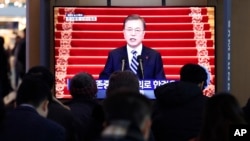Pyongyang is unlikely to respond positively to a call by South Korean President Moon Jae-in for reviving inter-Korean projects and efforts to invite North Korean leader Kim Jong Un to Seoul, experts say.
“I don’t think there’s a great chance for North Korea to respond to this [positively],” Park Won-gon, a professor of international studies at South Korea’s Handong Global University, said.
In his New Year’s address delivered Tuesday, Moon urged his government to push forward with stalled inter-Korean projects. Moon also called for renewed inter-Korean efforts to invite Kim to South Korea.
“The South and North should work together to create the conditions for Chairman Kim Jong Un’s visit [to South Korea] as soon as possible,” Moon said.
“I have a willingness to meet again and again and hold ceaseless dialogue. We will continue to invest efforts for resumption of the Kaesong Industrial Park and tours to Diamond Mountain,” he said.
Robert Manning, a senior fellow at the Atlantic Council, said, “I admire [Moon’s] perseverance, but I think Kim’s behavior toward [South Korea] over the past year has been crystal clear.”
“Kim feels he has gotten all he can from Moon, that Moon won’t go beyond U.N. sanctions, that Moon is a one-term president with two years left, and therefore, Kim has no use for him," he said.
In June, Kwon Jong Gun, chief of the North Korean Foreign Ministry’s U.S. affairs department, said, “It’s better for the South Korean authorities to mind their own business at home.”
Three summits
Moon and Kim have held three summits since inter-Korean ties thawed in 2018, and Kim set a foot across the inter-Korean border at their first summit, held in April 2018.
On November 5, 2019, Moon invited Kim to attend a regional summit in Busan, South Korea, later in the month, but Kim declined the offer.
The two leaders had agreed to restart inter-Korean projects at the Kaesong Industrial Complex and Mount Kumgang tourist site when they met at their third summit, held in Pyongyang in September 2018.
The two projects were at the heart of Seoul’s rapprochement with Pyongyang since late 1990s.
Tours of the scenic Mount Kumgang began in 1998, but after a North Korean soldier fatally shot a South Korean tourist in 2008, Seoul ended the tours.
Seoul began its joint industrial project with Pyongyang at the factory park in Kaesong in 2004 but shut it after North Korea conducted a long-range missile test in earlly 2016.
The closure deprived North Korea of revenue that North Korean factory workers generated to earn hard currency for the state economy.
Seoul’s agreement to resume joint projects with Pyongyang, however, has been prevented because the U.S. has maintained sanctions on North Korea over its nuclear weapons and missile programs. U.N. sanctions imposed on North Korea since 2016 prohibit establishing joint ventures with North Korea.
Park, the Handong Global University professor, said Moon made clear in his speech that Seoul “should pursue joint projects with Pyongyang to improve inter-Korean ties even if U.S. and international sanctions have to be evaded.”
Ties between Seoul and Pyongyang began fraying after the Hanoi Summit in February, where Kim failed to secure sanctions relief from President Donald Trump.
North Korea has been looking for Seoul to resume inter-Korean projects as a way to make money. But Seoul has been dragging its feet because the U.S. refused to relax sanctions at the Hanoi Summit and has been maintaining them, despite Pyongyang’s call for the U.S. to change its stance.
Inter-Korean relations deteriorated further, and in October, Pyongyang, apparently expressing its anger over Seoul’s inability to defy sanctions, told South Korea to clear its properties from the Mount Kumgang resort area and ordered the facilities demolished.
Joshua Pollack, a North Korean expert at the Middlebury Institute of International Studies in California, said, “Kim is unlikely to act on [Moon’s effort to invite him] under present circumstances.”
"Even under better circumstances, I wouldn’t have expected it to happen soon," Pollack said.
Cho Han-bueom, a senior researcher at the Korea Institute for National Unification in Seoul, said, “Kim is not in a situation to refuse improved ties” with Seoul because the North Korean economy is suffering due to sanctions.
Michael O’Hanlon, research director at the Brookings Institute, said, “I think President Moon is fine to want to ease tensions, but he can’t develop a strategy separate from that of the U.S. and separate from the fact that North Korean behavior is, on balance, not improving and talks are not progressing.”
Any visit by North Korea should “ideally help push along nuclear talks," O'Hanlon said. "Otherwise, it could be a waste of time or even counterproductive, revealing chasms between Washington and Seoul more than anything.”
Tests and warnings
Talks on denuclearization between Washington and Seoul have remained stalled since October 2019, despite summits held in June 2018 and February 2019, and an impromptu meeting Trump held with Kim in June 2019 at the inter-Korean border.
Since May, North Korea has conducted 13 missile tests and issued a series of warnings that it will seek a “new way” if the U.S. maintains its current stance on sanctions.
Last week, Kim said North Korea “should push ahead with the development of strategic weapons” and dropped a self-imposed moratorium placed on testing long-range missiles.
Kim also seemed to have given up on demanding sanctions relief, saying, “The present situation that warns of a protracted confrontation with the U.S. urgently requires us to make it a fait accompli that we have to live under the sanctions by the hostile forces.” He called on his country to rely on its economic self-sufficiency.
Kim did not mention expectations for resuming inter-Korean projects or improving inter-Korean ties in his speech.
Christy Lee contributed to this story, which originated on VOA’s Korean Service.




